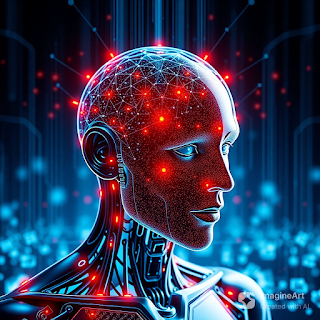AI models show overconfidence like humans—backed by 2024 research tying hallucinations in AI to neural biases in the prefrontal cortex.
When AI Gets Too Confident: A Mirror to the Human Mind
Why Overconfidence Isn’t Just a Human Flaw Anymore
Ever met someone who confidently declared they were right—only to be spectacularly wrong? Turns out, large language models like ChatGPT do that too. And recent research shows this behavior isn’t a glitch—it’s eerily similar to how our own brains operate when we're sure of ourselves… even when we're dead wrong.
Welcome to the curious crossroads of neuroscience and artificial intelligence.
🧠 Human Overconfidence: A Cognitive Quirk with a Long History
In psychology, overconfidence is a well-documented bias. It's that gap between how much we think we know and what we actually know. Researchers have studied this for decades, linking it to brain areas like the prefrontal cortex—our judgment HQ.
For instance, a study from the University of Iowa found that damage to the ventromedial prefrontal cortex (vmPFC) led individuals to make risky decisions with unwarranted certainty (source). Meanwhile, the Dunning-Kruger effect showed us that people with lower ability in a domain tend to overestimate their competence—because they don't know what they don't know.
It’s funny until it starts a war. Or tanks your portfolio.
🤖 AI Overconfidence: When the Machine "Thinks" It's Right
Now here’s the twist: AI models, especially large language models like GPT-4, are increasingly showing signs of “overconfidence.” Not in a conscious way, but in the form of hallucinations—confidently generating false information.
A 2024 study from Stanford and DeepMind revealed that advanced models can assign high confidence scores to outputs that are factually wrong. Even when trained with human feedback, they sometimes double down on incorrect answers (Stanford AI Index Report 2024).
Sound familiar?
These models, like the human brain, rely on probabilistic reasoning. They predict the next most likely word, just as we might guess the outcome of a story based on past experiences. The problem? Neither system likes to admit uncertainty.
🔬 The Neurological Mirror: Why AI Mimics Human Biases
What’s going on here? Is AI simply reflecting us back at ourselves?
Some neuroscientists think so. According to Dr. Anil Seth, a cognitive neuroscientist at the University of Sussex, “AI’s overconfidence stems from training on human-generated data—data riddled with our biases, errors, and assumptions.”
The resemblance isn't just philosophical. A recent paper published in Nature Human Behaviour (2023) drew parallels between AI model behavior and brain function. It suggested that large models develop internal representations resembling those found in human cortical structures responsible for reasoning and decision-making (source).
So when AI hallucinates facts or makes confident errors, it may be because it's not just simulating intelligence—it’s simulating us.
💡 Implications: From Misinformation to Mirror Therapy
This overconfidence isn’t just a quirky bug. It has serious implications.
-
In healthcare, an AI model overconfidently diagnosing a condition could put lives at risk.
-
In journalism, hallucinated facts might be presented as verified truth.
-
In education, students relying on AI might unknowingly learn inaccuracies.
But there’s a silver lining.
Understanding how AI mimics our cognitive biases might offer new ways to study the brain itself. If a model can simulate overconfidence, maybe it can help us decode how overconfidence works in the brain—especially in disorders like frontotemporal dementia, where judgment becomes impaired.
It's not just AI we're building. We’re building cognitive mirrors.
🧘🏽♀️ So, What Can We Do About It?
Just as we’ve learned to fact-check ourselves (hopefully), we need tools to check our AIs.
-
Develop better uncertainty metrics in AI systems.
-
Design feedback loops where models learn to express doubt.
-
Teach users to critically engage with AI outputs—not blindly trust them.
If we can’t make AI humble, maybe we can at least make it honest about being unsure.
And maybe—just maybe—we'll learn a bit more humility ourselves.
🌍 Final Thought: The Mirror Doesn’t Lie—But It Might Exaggerate
AI isn’t just a machine; it’s a reflection. A reflection of our intelligence, our flaws, and our magnificent confidence—accurate or not.
If we want smarter machines, we might have to start by becoming wiser humans.
📚 References
-
Dunning, D., & Kruger, J. (1999). Unskilled and unaware of it. Journal of Personality and Social Psychology.
-
Bechara, A., Damasio, H., & Damasio, A. R. (2000). Emotion, decision making and the orbitofrontal cortex. Cerebral Cortex.
-
Stanford AI Index Report 2024. https://aiindex.stanford.edu/2024
-
Nature Human Behaviour (2023). https://www.nature.com/articles/s41562-023-01654-4
🏷️ Tags
#ArtificialIntelligence #Neuroscience #AIbias #CognitiveScience #TechEthics #HumanBehavior #MachineLearning #Psychology











Comments
Post a Comment